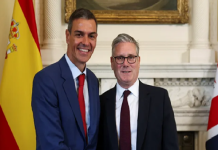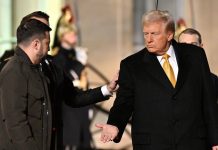WASHINGTON (Reuters) – The Qatari prime minister held secret talks with the supreme leader of the Taliban this month on resolving tension with the international community, a source briefed on the meeting said, indicating a new willingness by Afghanistan’s rulers to discuss ways to end their isolation.
U.S. President Joe Biden’s administration was briefed on the talks and is “coordinating on all issues discussed” by the pair, including furthering dialogue with the Taliban, said the source.
The meeting represents a diplomatic success for Qatar, which has criticized Taliban restrictions on women while using long-standing ties with the Islamist movement to push for deeper engagement with Kabul by the international community. The United States is calling on the Taliban to lift bans on girls’ schools and women’s work, including by UN agencies and humanitarian organizations, in order to restore freedom of movement and bring Afghans from outside the Taliban into the government.
The source’s comments are hopeful of a breakthrough in ending the world’s only ban of its kind and alleviating the dire humanitarian and financial crisis that has left tens of millions of Afghans starving and unemployed. He suggested the U.S. government was in favor of stepping up lower-level talks, which have hitherto been unproductive.
The White House declined to comment on the meeting. The State Department and the Qatari Embassy in Washington did not respond to requests for comment.
The Taliban did not respond to requests for comment. Prohibition of education and employment.
Restrictions on women’s education and employment opportunities have hampered humanitarian aid, and the government will take power in August 2021 after the withdrawal of the last US-led international force after 20 years of war and the collapse of the Western-backed government. It is the main reason why no country has recognized Taliban rule since its seizure.
The Taliban’s treatment of women and girls could amount to crimes against humanity, said a UN report to the Human Rights Council in Geneva in March. The Taliban claim to respect women’s rights in line with their interpretation of Islamic law and Afghan customs.
A staunch Islamist, Mr. Haibatura has shown little compromise when it comes to his own statutes.
But a meeting with Sheikh Muhammad suggests he is willing to explore ways to break Afghanistan’s isolation and boost aid programs as the country plunges into hunger and poverty. “It was a very positive meeting,” said the source. Haibatura is “very interested” in continuing dialogue with the international community.
However, given the treatment of women and poor human rights conditions, senior members of the Taliban government remain under U.S. and international sanctions, so it is by no means guaranteed that other countries will eventually recognize the Taliban government.
Sheikh Mohammed told Haibatura about the need to lift bans on women’s education and employment, including bans on working in UN agencies and other humanitarian organizations, sources said.
Since January, the Taliban government has promised written guidelines to allow aid agencies to operate with female workers. The Taliban banned secondary education for girls in March 2022 and extended the ban to universities in December.
They say they will reopen secondary schools for girls if “conditions” such as the development of an Islamic curriculum are met.
Sheikh Muhammad and Haibatullah also discussed efforts to resolve the humanitarian crisis in Afghanistan.
The United Nations says nearly three-quarters of Afghanistan’s 40 million people are in need of aid and warns that funds are running out.
According to sources, Amir Muhammad told Haibatullah about the “continued efforts of the Taliban on the ground” to combat terrorism, apparently in Kabul’s efforts to dismantle Islamic State-affiliated groups. It is said to have been mentioned.
The Taliban’s main ideological opponents, mainly based in eastern Afghanistan, target ethnic minorities and their embassies in Kabul.
Sheikh Mohammed, who is also Qatar’s foreign minister, met publicly with Taliban Prime Minister Hassan Akhund in Kandahar on the same day he met with the supreme leader. He was accompanied by the Qatari intelligence chief.
However, neither side has announced a meeting with Haibatura.
Although he rarely leaves Kandahar, he has been the Taliban’s main religious, political and military leader since 2016, leading the campaign to overthrow Kabul’s Western-backed government. Qatar allowed militants to open political offices in Doha in 2013, facilitating talks with Washington, leading to a 2020 agreement to withdraw a US-led international force it had fought for two decades.
The minor Gulf monarchy does not have formal diplomatic relations with Afghanistan, but an embassy in Kabul is open and represents US interests in the country.
Qatar has long urged the international community to agree on a “roadmap” of steps toward recognition of the Taliban, saying Afghanistan’s isolation could undermine regional security.






